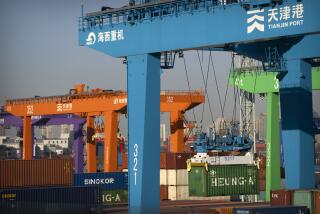OECD Upbeat About World Economic Growth, Trade and Stable Dollar
- Share via
PARIS — Bolstered by new pledges of economic and monetary action from Japan and West Germany, the Organization for Economic Cooperation and Development ended a two-day meeting here Wednesday in a confident mood about the outlook for growth, trade and stabilization of the dollar.
“All in all, we think this was a very good (meeting),” U.S. Treasury Secretary James A. Baker III said.
Although the OECD is forecasting a slowdown of economic growth in the industrial world in the coming year to 2.5% from 3%, Baker said: “There is no reason to be down in the mouth about this.”
The West German economics minister, Martin Bangemann, who chaired the meeting, said the slowdown “should not lead to pessimism.”
He said the overall result of the Paris meeting was “to send a signal of confidence for this year and next.”
Bangemann told the press that his government expects to take further action in June to stimulate the West German economy if, as expected, economic figures for the current quarter confirm a slowdown that began in the first quarter of the year.
Japan, meanwhile, intends to bring in a supplemental economic budget for similar action to stimulate the economy once its regular budget has been approved by Parliament.
Baker noted that both Japan and West Germany have already moved to lower interest rates--with the intention of stimulating growth--and said he expects that “the decisive period will now probably be in early September, when we will begin to see the effects of further moves in both Japan and Germany to stimulate growth and reduce trade surpluses.”
As for the dollar, Baker said: “I have made it clear that any further decline of the dollar could be counterproductive. We are all agreed on the necessity of full implementation of the Louvre agreement of last February to stabilize (its value), and I think it will do the job.”
Baker told the OECD that the U.S. budget deficit should “show a decline of some $40 billion this year from the last fiscal year, and next year we should get additional reductions of at least $20 billion, even in a worst-case scenario.”
He said this will represent a drop from 6.3% of gross national product in 1983 to 3.9% in the current fiscal year.
The general U.S. deficit, he said, taking into account local and state obligations and the surpluses for Social Security, will be down to 2.5% of GNP, below the OECD average.
Baker said the U.S. trade deficit “appears to have leveled off in value terms, and we have already seen a turnaround in trade volume.”
The United States “is now in its 54th month of continued expansion, the longest such period since the war,” he said, and added that “for several years we have heard predictions that expansion would stop, but it keeps right on going.”
Perhaps the biggest achievement of the meeting was agreement, for the first time in the history of the 24-country organization, to take up on a multilateral basis the problem of agricultural subsidies and agriculture policies.
The OECD secretariat prepared a report of more than 400 pages summarizing the subsidy policies and agricultural problems country by country.
The meeting’s final communique outlined the objectives of a common program of reform, “which will be implemented in a balanced manner.”
Quick results on the agricultural front are not expected, but as Bangemann told the press: “The problem has become too great for any one country to deal with it on its own. We have to act in a concerted manner.”
Baker hailed the outcome as “a major step forward that sets the stage for comprehensive action.”
Much of the discussion at the meeting centered on the problems of structural changes in the various national economies, which have to be pushed through even though they often mean a temporary slowdown in growth--the phasing out of obsolete steel plants, for example.
The communique recorded agreement that “action must be broad, bold, sustained and to the extent possible built on international economic cooperation.”
More to Read
Sign up for Essential California
The most important California stories and recommendations in your inbox every morning.
You may occasionally receive promotional content from the Los Angeles Times.













